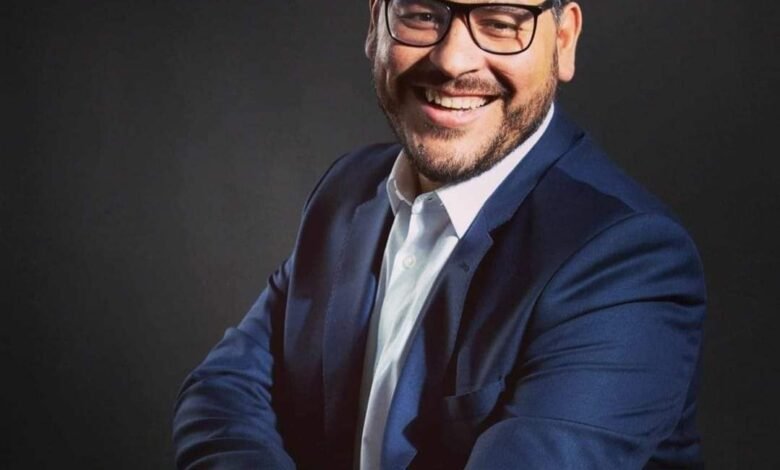
In a world challenged by the digital revolution, Franco-Algerian entrepreneur Ammar Khadraoui was not afraid to go back to school several times to acquire and develop new skills. A business school graduate, he discovered gamification while studying for a master’s degree in innovation at Central Supelec. He became one of the few people working in this field in Africa and the Middle East. Career
By Dounia Ben Mohamed
« I am a milk butter ». This is how Ammar Khadraoui likes to define himself. Born in Bordeaux, he spent the first part of his life in France, where he studied economics in La Rochelle before starting his career as a strategy consultant after a spell as deputy marketing director at Auchan Ile-de-France. He continued his international career between Europe and the Middle East before crossing the Mediterranean to his parents’ country.
« My father dreamed of having a son in Algeria. Looking for a group with an international dimension, I joined Suez before creating my consulting firm, ASMOS Consulting, in 2011. We advise on strategy, transformation, business lines, value chains, management, data… to operational excellence, collective intelligence and change management. We are now present in several countries: Algeria, Rwanda, Morocco, Côte d’Ivoire, DR Congo and soon back in France and on the road to the « Middle East ».
Faced with the realities of a market in constant flux and in search of competitiveness, the business manager decided to go back to school for an update. « I joined Centrale Supelec, where I worked on a professional thesis on activating and accelerating change and commitment in a complex context. That’s where I discovered gamification ». He decided to get involved and became one of the few to do so in Africa. « I returned to Algeria at the end of 2018, hired a computer graphics designer and started a business unit. We are now the only company in Africa doing bespoke, physical serious games. Our clients include the United Nations, the World Bank, the European Union, Total, Schneider Electric, Société Générale, Henkel… multinationals, development agencies, national leaders… We have accompanied our clients so much in their digital transformation that the fever of SaaS (« Software as a Service ») platforms has caught us. »
We need to be competitive
This success is the result of constant adaptation to international standards and the search for competitiveness. “When we are in a market, we have to be competitive at all levels and know how to maintain our position; when we choose niche sectors, we have to be innovative and add value, » says the entrepreneur. Today, we have a range of more than seventy serious games, which allows us to move from a business unit to a new company in full spin-off mode. And he confides: « I would never have thought that we could go from Algeria to markets like Rwanda, France and Saudi Arabia. The requirement adapts to everything. Understanding international standards and national requirements, Glocalization has helped us a lot. and has working with multinationals. We know them, we understand them, we have evolved with them. They are always demanding innovation, competitiveness, change, sustainable development and, above all, development and human capital.”
Transformation at the heart of everyday life
And as Africa seeks to succeed and accelerate its digital transformation, Ammar urges his peers not to skip any important steps. « We need to put transformation at the heart of everyday life, it is an incremental process with undeniable prerequisites, no information systems, no process automation and above all, no actionable, reliable, clean and rich data. At the scale of our organizations, skills used to have a lifespan of thirty years. Since COVID we have gone down to four years, at most two years today. The paradigm has changed. Although digital technology has broken down borders and entry rights and models of collaboration, cooperation and interdependence, the need for engineering, efficiency and research and development remains central. So does the need to make our ecosystems learning. We need to learn continuously and allow our human wealth to learn autonomously.”
A new context that brings new opportunities and challenges for Africa. « We can be in Algiers, Victoria Falls, Abidjan or anywhere else in the world and we can respond to complex problems provided we are aware of and agile with the new mutations such as collective intelligence, quantum computing with new analytical powers, instant technologies such as 5G and 6G… But it is even more important to be able to understand, create, develop and deploy applications that respond to concrete needs. The dogmas have fallen, young people without diplomas are becoming great developers, specialists in cybersecurity, data processing and analytics. This is disrupting practices and questions of sovereignty and leadership. But it is also the challenge for our African ecosystems to be able to converge, to work together, to work in synergy, to cover the value chains and to focus on the strategic links that create wealth, not just value. How can we do this without information systems, without the mastery of engineers, technologies, resource transformation, knowledge sharing, quality management and the need for leadership with real forward-looking, productive and sustainable visions? The human being, our opportunity and our net capital, may become our scarce resource if we do not build locally, regionally and globally the answers of our Africa, without borders, without complexes, without dependencies and above all open to exchanges through the competitiveness of its knowledge, its production and its human resources ».
The ability of collective intelligence to flourish
This requirement is at the heart of the ASMOS Group, which is present on the transformation value chain through its service offerings, with this quest for excellence, innovation and « high added value ». I am convinced that we can make our transformations concrete and sustainable by offering complete solutions: consultancy, data, the ability to change through gamification and, beyond that, the ability to make collective intelligence flourish, » says the manager. In Africa, we talk a lot, we write a little; gamification allows us to make this happen ». Through a specific tool launched by the group, the Skillym platform. « Today, this platform allows us to understand the challenges of companies, organizations and ecosystems, to map knowledge, interpersonal skills and personal and professional aptitudes, with functionalities for creating paths, careers, mobility, training and development plans. We have implemented it in North Africa. Three platforms will be nested in this first layer: change management, CSR, the ability to pilot development projects for states and ministries, which will allow us to support the projects we have launched in the Democratic Republic of Congo and Rwanda. »
The ASMOS Group, through its subsidiary ASMOS Africa, has signed a Memorandum of Understanding with the pan-African organization Smart Africa. Founder and President of the Group, Ammar Khadraoui, is very proud of this achievement after thirteen years of building on the ground.






